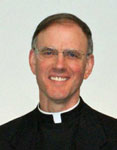Podcast: Play in new window | Download (Duration: 27:56 — 19.2MB) | Embed
Subscribe: Apple Podcasts | Spotify | Amazon Music | Android | Pandora | iHeartRadio | JioSaavn | Podchaser | Gaana | Podcast Index | Email | TuneIn | Deezer | Anghami | RSS | More
Episode 5 -The Third Rule: 
Of Spiritual Consolation. I call it consolation when some interior movement in the soul is caused, through which the soul comes to be inflamed with love of its Creator and Lord; and when it can in consequence love no created thing on the face of the earth in itself, but in the Creator of them all.
Likewise, when it sheds tears that move to love of its Lord, whether out of sorrow for one’s sins, or for the Passion of Christ our Lord, or because of other things directly connected with His service and praise.
Finally, I call consolation every increase of hope, faith and charity, and all interior joy which calls and attracts to heavenly things and to the salvation of one’s soul, quieting it and giving it peace in its Creator and Lord.
In this episode, Father Timothy Gallagher, in conversation with Kris McGregor, explores Ignatius’ Third Rule of Spiritual Consolation. Spiritual consolation, as defined by Ignatius, involves an interior movement in the soul that ignites love for the Creator.
The rule encompasses various experiences, such as shedding tears for sins or the passion of Christ, an increase in hope, faith, and charity, and an interior joy attracting to heavenly things.
Father Gallagher emphasizes the importance of discerning spiritual consolation, distinguishing it from non-spiritual consolation, and recognizing it as a gift from God. Examples of individuals experiencing spiritual consolation are shared, highlighting the intensity and connection between non-spiritual and spiritual consolations.
The goal is to help listeners understand and name these experiences when encountered in their spiritual lives.
Discerning Hearts Reflection Questions:
- Defining Spiritual Consolation: How would you define spiritual consolation based on Ignatius’ Third Rule, as explained by Fr. Timothy Gallagher?
- Personal Experience: Can you recall a personal experience of spiritual consolation in your life? How did it manifest, and what impact did it have on your relationship with God?
- Connection between Consolations: Fr. Gallagher mentions the connection between non-spiritual and spiritual consolations. Can you identify instances in your life where a non-spiritual consolation served as a space for God’s grace to bring about spiritual consolation?
- Degrees of Intensity: The episode highlights the varying degrees of intensity in spiritual consolations. Reflect on a time when you experienced a gentle uplifting of the heart versus a more intense uplifting. How did these experiences differ?
- Response to Consolations: How do you typically respond to moments of spiritual consolation? Are you aware of these moments, and do you consciously accept the light they bring?
- Discerning Consolations: Fr. Gallagher emphasizes the importance of discerning between spiritual and non-spiritual consolations. How can this discernment deepen your spiritual life and relationship with God?
- Role of Tears: Consider the examples of tears of gratitude discussed in the episode. Can you relate to these experiences, and how have tears played a role in your spiritual journey?
- Virtues of Hope, Faith, and Charity: Reflect on the role of hope, faith, and charity in your spiritual life. Are there specific moments when you’ve felt a noticeable increase in these virtues as a result of spiritual consolation?
- Incorporating Teachings: How can you incorporate the teachings from this episode into your daily spiritual practices and deepen your understanding of spiritual consolation?
- Recognizing and Naming Consolations: In what ways does recognizing and naming spiritual consolations contribute to your overall awareness and engagement in your faith journey?
 The Discernment of Spirits: Setting the Captives Free – Serves as an introduction to the Spiritual Exercises of St. Ignatius of Loyola
The Discernment of Spirits: Setting the Captives Free – Serves as an introduction to the Spiritual Exercises of St. Ignatius of Loyola
The 14 Rules for Discerning Spirits –
“The Different Movements Which Are Caused In The Soul”
as outlined by St. Ignatius of Loyola can be found here
Father Timothy M. Gallagher, O.M.V., was ordained in 1979 as a member of the Oblates of the Virgin Mary, a religious community dedicated to retreats and spiritual formation according to the Spiritual Exercises of St. Ignatius. Fr. Gallagher is featured on the EWTN series “Living the Discerning Life: The Spiritual Teachings of St. Ignatius of Loyola”.
For more information on how to obtain copies of Fr. Gallaghers’s various books and audio which are available for purchase, please visit his website: www.frtimothygallagher.org






